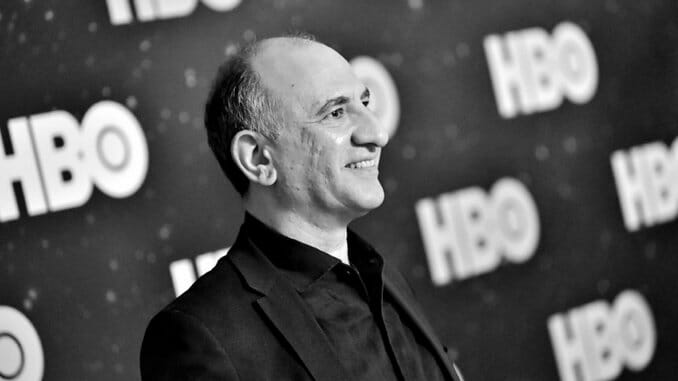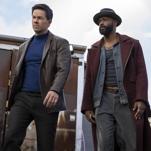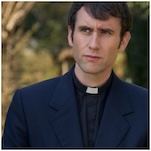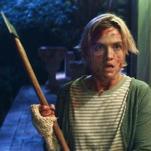Armando Iannucci Is the Cruel, Hilarious Prophet of Our Decline
Photo courtesy of Getty Images
“The universe we live in increasingly resembles some kind of dark satire about the decline of the United States.”
-Paul Waldman, Washington Post, May 20, 2020
The story of Cassandra, the priestess of Greek mythology, is so relevant today that it’s probably over-used. You probably know the gist—she’s the one who had the gift of prophecy, and warned her father King Priam and the rest of the Trojans that the Greeks would destroy them. She knew about the Trojan Horse, but nobody would listen to her, and she was doomed to shout into the void, unnoticed and unheeded.
It’s a useful metaphor that has probably been applicable to every single epoch in human history, and we’ve all felt like Cassandra at some point in our lives. In today’s western world, though, the Cassandra myth runs deeper, because there is no single voice that people ignore; there’s an entire chorus. Even the people in power, the ones with the alleged ability to change things, often know exactly what’s going wrong. Nevertheless, we seemed to be locked in an erosive cycle of corruption and collapse, and self-awareness can’t change a blessed thing. We know what’s happening—it’s obvious—and though we can describe it, Cassandra-like, we are helpless to do a single thing about it. The maddening sensation is of living in a story with a fixed end, with all notions of free will dashed on the rocks.
Most television, and most movies, tend to ignore this reality. It’s just too cynical. If they explore a theme of dysfunction, it’s on an individual or group level, but there are always rational actors who fill the role of savior, and there is always comeuppance. The very rare exceptions tend to be comedies like Arrested Development, which are avowedly amoral but also distanced from reality by a certain zaniness.
Yet there is one man who leans into the entropy, who seems intent on laughing his way to the apocalypse, and that man is Armando Iannucci. In his comedies, from The Thick of It to In the Loop to Veep to The Death of Stalin to the more recent Avenue 5, he stares unblinking at societal incompetence and corruption, and steadfastly refuses to bail us out. It became a cliche during Veep’s run for politicians and their affiliates to say that it represented a truer vision of Washington D.C. than a hopeful melodrama like The West Wing, and by now it should be apparent even if you’re not an insider.
Cassandra’s gift of prophecy is offset by the jealous god Apollo with the curse of never being heard, and her story is presented as tragedy. Rightly so, because after the fall of Troy, she was taken as a concubine and later murdered. But if you imagine Cassandra free of anxiety, twirling around Troy in the days leading up to the massacre, laughing maniacally and shouting, “you idiots! You’re all going to die!”, then you have a close approximation of Iannucci’s role in our culture.
The Thick of It, sadly, is his least known work in America, and I say “sadly” because it features the greatest character in sitcom history: Malcom Tucker, played by Peter Capaldi. Tucker is powerful, within his sphere, and inspires terror with what is truly the greatest array of insults ever written by mankind. I mean, just watch:
The funny thing is, Tucker’s relative competence and power is circumscribed by the chaos and disorganization of the system he serves. His abilities as the Prime Minister’s hatchet man are used to put out fires, to deliver contradictory messages (sometimes in rapid succession), and to keep his party, just barely afloat. If the joke about The West Wing is that it’s a liberal fantasy in which liberals don’t even really accomplish anything, The Thick Of It doesn’t even pretend that better things are possible. Victory is a matter of survival, all triumphs are Pyrrhic, and a man like Malcolm Tucker is used as a weapon to destroy enemies and keep the bleating sheep below him in line, but never to actually make a better world. That idea is worth no more than a scoff. He yells and threatens in an effort to maintain the status quo, and even this is bound to fail—the wit and power he possesses cannot come close to overriding the invisible hand of decay, and so he is ultimately impotent, chewed up and spit out in the end by the machine he had seemed to master.
And in Iannucci’s universe, that’s what passes for strength.
Tucker also appears in the film In the Loop, which is a more direct satire in the sense that it retells the moment when U.S. and British leaders cooked up evidence for the Iraq War. Like The Death of Stalin almost a decade later, it relies only loosely on historical fact to depict a critical sequence in history, but nonetheless is far more accurate in spirit than most contemporary coverage. The credulity of American and British media gave way to limp regret when the obvious lie was exposed and the war turned into a lingering disaster, but many of the same columnists who served as Bush and Blair’s primary cheerleaders are still working at the biggest papers and magazines, as idiotic and bloodthirsty as ever. We’re living through the reckoning of that war, and will continue to do so for decades, but a film like In the Loop is one of the few instances of true cultural comeuppance. The comedy, acerbic and hilarious as it may be, can’t disguise how much Iannucci and his writers loathe the power-brokers who let greed be their guide, and loathe the system that is so comprehensive and all-powerful that the notion of a conscientious objector is practically laughable.
Of course, we can’t forget that Iannucci is a version of Cassandra, and it goes without saying that the impact of such a movie on political matters is negligible.
Veep is an Americanized Thick Of It, but it’s more than an adaptation—even as the vehicles of corruption are basically the same, Veep captures something glossy and superficial and madly ambitious and tragically sincere about America that is drab and sallow and gray and wreathed in irony in Britain. It’s no coincidence that he seized on the position of vice president to showcase political powerlessness in its most frustrating form, nor that the writers repeatedly deny Selina Meyers the satisfaction she craves. Again, the depiction is of a system without an ideological center, and so the “drama” is not about passing great legislation or improving a nation, but about emerging beaten but alive from each successive scuffle, only a little worse off each time.
Jesse Armstrong wrote with Iannucci on several shows, and later created Succession, which bears such a strong imprint of its predecessors. One thing that always made me laugh, though, was when Succession trotted out a character meant to roughly simulate Bernie Sanders. A person like Sanders, a rare political figure who hasn’t lost his true north despite decades in the political wilderness, is very much out of place in the Iannucci multiverse, and I was immediately curious how Armstrong would treat him. No surprise, he takes a deal—like everyone else, Eavis has his price, and integrity is just an illusion. In other words, Armstrong couldn’t quite tolerate a Bernie Sanders type. He had to become corrupt in the fictional world they occupy, though in real life men like that simply lose.
HBO’s Avenue 5 may seem like a thematic departure for Iannucci, since it takes place in space rather than the terrestrial political world, but in fact it’s a natural evolution. Here, we see a space cruise gone wrong, where a trip meant to take eight weeks gets accidentally prolonged to, at minimum, three years. The captain, played by the wonderful Hugh Laurie, is not a real captain at all, and even his accent isn’t real. Despite his own artifice, he initially has no clue that the crew is also fake. The one man who knew the most about the ship is dead, and what’s left are panicky passengers, a moronic billionaire, and a few smart people who aren’t smart enough to do anything about it. Like The Death of Stalin, this is a claustrophobic horror story disguised as a comedy, and the horror is perhaps expressed best here because it includes the element of technology. Iannucci already made his point about politics, and now he’s making it about tech—our advances, no matter how impressive, will always be in thrall to the broader corruptions of western society and human incompetence. Instead of utopia, all we’re really seeing are greater blunders. We can build space ships, but people will find a way to screw it up and make it genuinely harmful, just as we’ve managed to do with, say, the internet.
It would be lovely if Iannucci’s worldview was somehow flawed, but more than any other artist currently working, life continues to validate him. This kind of cynicism is all-consuming, and leaves no room for a “good guy,” which is why his work is beloved in America by its fans but not widespread. Far from offering any bromides, the cruelty of these shows is relentless, and gets more uncomfortable as reality seemingly races to catch up with his imagination. Iannucci has been telling us what’s wrong with our institutions for years, almost literally slapping us in the face with it, and stands as the smartest, most prescient man in show business. He sees the obstacles with great clarity, but more importantly, he sees the elements of our nature that makes those obstacles so impossible to overcome.
Thank God he’s so good at making us laugh, because we certainly won’t listen.
Shane Ryan is a writer and editor. You can find more of his writing and podcasting at Apocalypse Sports, and follow him on Twitter here.







































